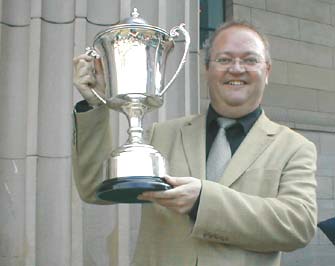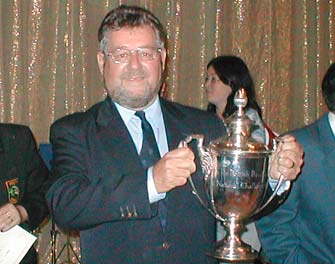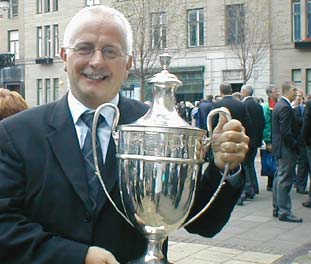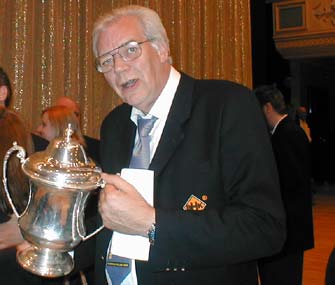|
National Championships 2003
Dundee Revisited - 4BR looks back at the Dundee weekend
4BR had a great time in Dundee. Someone once said that anyplace,
anywhere in the world will be a long way from someone’s home,
but even if some bands did have to make a longish trip North, it
was well, well worth it.
Dundee had plenty of very high quality hotels, some great restaurants
(some of which 4BR had a fine time), nice beer and a Concert Hall
that was a delight to perform in (even if it was a bit on the cramped
side for the traders). All in all, after the debacle of Torquay
twelve months ago, the 2003 Lower Section National Finals were excellent
value for money, and much of the credit for the success must go
to the organisational abilities of the BFBB who put behind them
the disappointment of losing this franchise in the future to put
on a farewell contest that was well worth 196 points off their final
draw allocation.
The BFBB has come in for justified criticism over the past couple
of years, but it must be said that they have learnt the lessons
of their mistakes and which resulted in a very professionally run
event this time around. The future of the contest will now be in
the hands of private promoters – and we wish them every success,
but we hope the expertise of the likes of Norman Jones, Robert Norman,
the indefatigable Frank Hodges and the rest of the B.F.B.B. team
will be utilised to the full. To lose their expertise now would
be a great blow to banding in the UK.
Dundee was also a success because the Music Panel of the BFBB made
some enlightened choices in the music department. The Fourth Section
work, “Call of the Sea” was perhaps the weakest of the
four, and but it still tested the bands on the stage, whilst “Four
Preludes” and “Sunset Rhapsody” were as good a
test of Third and Second section bands that we have heard for some
time. “A Kensington Concerto” meanwhile again proved
a very, very difficult mistress to subdue and master. The top bands
in Norway found great difficulty with it earlier this year, and
even more so did the First Section bands here. Solo cornet players
the length and breadth of the UK will be gladdened to see their
parts consigned to the dusty archives of the bandroom music cupboard.
There were a few eyebrows raised on the weekend with the choice
of judges – although for us they offered a good mix, whilst
a few questions were raised when the choice of the 2004 Regional
test pieces were announced as well - “Vizcaya” for the
Third Section seemed to be a surprise. There were also a few missed
heartbeats for MD’s when the official programme noted that
the set work for the Fourth Section which was due to take place
about one hour later was “Sunset Rhapsody”! Thankfully,
this was a printer’s error.
And so to the contests themselves.
The first thing we would say to all those people out there who
saw us working away like Trojans over the two days is thanks for
all your kind comments as you passed us by in the corridors outside
the hall (good, bad or usually sarcastic!), and we do apologise
for not being “online” right from the start of the contest
weekend. This was not due to any excessive celebrations the night
before, but due to the fact that due to the solid construction of
the Hall we couldn’t get a strong enough signal to upload
from our laptops! Thanks to Frank Hodges who once again saved the
day.
The second thing to say is that believe it or not, we were not
the official adjudicators. We heard every one of the 76 bands on
the weekend (as did Alan Jenkins of BBW) and freely gave our opinions,
but we were not the people who the bands had to impress. They were
in the sturdily constructed tent, and so, if some people thought
we were a little way out with our observations, then so be it. We
didn’t agree with all the results – but it wouldn’t
be a brass band contest if we all did would it? We were there to
illuminate not adjudicate, and we know we can’t please everyone
with our comments – but looking back at what we wrote, we
still think we weren’t too far out.
The Fourth Section was as always a delight. Before the contest
we opted for a top six of Lockwood, Hayle, Grange Moor, Wardle,
Dinnington and Harlech, with Great Yarmouth as our Dark Horses,
and in the event things just about went to our great plan. (with
apologies for putting the kiss of death on Great Yarmouth of course)

Phil Shaw - Conductor. Wardle Band
Wardle and Phil Shaw were fine winners – a great seafarers
performance which the judges, Alan Morrison and James Scott both
thought was “excellent” and we thought bobbed along
brilliantly like Captain Pugwash aboard the Black Pig. They thoroughly
deserved the title. Behind them came Long Eaton off the number 1
draw (the early draws had a great time all weekend) who put in a
super show, and who had two tiddlers on the percussion section who
thumped the drums like the beater on Ben Hur’s slave ship,
whilst third place went to Grange Moor, who put in a very strong
performance that we thought more than deserved to feature highly,
but who the judges just thought were a little too inconsistent to
actually have won.
Behind them came Trinity Girls and Stuart Barton (although there
were a couple of lads in the ranks) who we thought were right up
there, the pre contest favourites Lockwood who shipped a bit too
much water in the shape of slips that cost them dearly and Harlech
who gave a swashbuckler of a performance to come sixth.
There were also fine performances from a whole batch of bands who
came behind these, and even those who came towards the end of the
prize list all gave good accounts of themselves and the music. It
made for a fine contest and the two judges were very pleased with
the overall standard when we spoke to them after the results. Some
they thought put too much aggression into the music (a feature of
the comments from the stage in all sections) whilst others failed
to capture the different tempo changes the markings implied. Still
– it was a great start to the weekend.
As the celebrations died down, the bands of the Third Section took
to the stage – no late night finishes this time around. Our
pre match predictions were a top six of Diggle, St. Dennis, Boarshurst,
Hoover, Hebden Bride and Lochgelly, with Carlton as our Dark Horses.
In the event Diggle did us proud, but they also showed that when
it came down to it, you can’t beat experience.

Alan Lawton - Conductor. Diggle Band
Alan Lawton directed a finely shaped musical performance that benefited
from some lovely playing from his players – some of whom like
David Pogson on principal cornet had tasted success many a time
at the highest level with Black Dyke. His playing was a feature
in a well-deserved winning show and nearly had us waxing lyrical
with a headline “Hey Diggle, Diggle”. As they say –
form is temporary, class is permanent.
The other podium places went to Hoover (Bolton) under Chris Wormald
who produced four movements of the set work that really captured
the Solemnity, Comedy, Tragedy and Pageantry that the composer and
the judges, Roy Newsome and Duncan Beckley wanted, whilst third
place was captured by the ever upwardly mobile Carlton Brass under
Tony Wilson. In the past few years this has been a band on the rising
slopes, and once more they did it again at the Finals. It could
have possibly been higher but for a poor third movement that cost
them points.
The remaining top six places went to the amazingly well supported
St. Dennis from Cornwall (as we said, some places are always further
away from home than others) who had some of the best young players
on show all weekend and whose flugel player was a real star performer,
whilst fifth place went to Sandhurst Silver off the number 1 draw,
who put in the marker for the rest to follow and who were not forgotten
by the men in the box. The final place went to another early draw
band with Conway Town who put in a strongly committed show that
caught the judges ears.
After that the standard was pretty well maintained by most of the
bands, although many of the performances were rather bland in execution.
There was a real need for there to be a difference in style between
the movements, but many of the MD’s stuck rigidly to safe
tempos and even safer dynamics which robbed the music of both flow
and expression. Roy Newsome in particular felt that many bands approached
the music with scant regard for the subtle tempo changes that were
needed, whilst the aggression in many shows was not what he was
looking for. It was music written by the brass band movements “Mozart”,
not, he said with respect, “Bourgeois”. The winners
were fine winners indeed, although the contest ended on something
of a sour note for some as reports came to us that members of the
Boarshurst Band had maliciously been tricked into believing they
had been announced as winners by some mean pranksters over their
mobile phones prior to the official results coming through. It was
a nasty sly trick, and we hope the culprits were found and suffered
an ignominious fate.
So day one was over, and as 4BR retreated to a superb steak meal
in a Mediterranean restaurant which was hosted by comedy Scottish/Italian
owner who had an accent even Mike Yarwood couldn’t copy, we
mulled over the day’s performances.
The standard we thought was pretty good indeed, and whilst we just
about agreed with the results, we were certainly in agreement with
Roy Newsome about the need for more of this music to be played at
this level, more often. The age old adage still applied –
modern bands can play loud and fast till the cows come home, but
soft and sustained still tests the to the limit. Eric Ball had come
through 41 performances a winner on points, and whilst the Champions
and top placed bands really got to grips with what the music asked,
there was still the feeling that we are rapidly losing the ability
to make a brass band sound balanced and light in timbre. Young players
in particular need to understand (and ultimately enjoy) the music
of Eric Ball – the crash bang wallop can come a little latter
on in life.
Sunday saw us bright eyed and bushy tailed (if you believe it)
and back at the Hall for the Second and First Section contests;
and to be truthful, the Second Section was the one contest of the
Finals that caused us the most head scratching of the two days.
There is no better man around than Graham O’Connor at winning
contests at any level, and once more he delivered the goods to the
judges Alan Morrison and Duncan Beckley with his band Hatfield Coal
Power. Second place went to Bollington Brass under Peter Christian
off the number 1 slot, whilst third place went to Lanner and District
directed by Stuart Chappell. The remaining top six places went to
Langbaurgh Brass in fourth, Arbroath Instrumental in fifth and Houghton
Brass in sixth. This is where the head scratching came in.

Graham O’Connor - Conductor, Hatfield Coal Power
Adjudicators Alan Morrison and Duncan Beckley came to the stage
and gave thoughtful and very descriptive remarks – Alan in
particular speaking of sunsets he had seen in some of the more exotic
holiday locations around the world. However, it was apparent that
many of the MD’s hadn’t experienced the Florida Keys
like Alan and the majority of the performances were slightly more
reminiscent of a sunset over the Windscale nuclear reprocessing
plant near Workington. Either that, or Alan and Duncan were hopelessly
lucky romantic souls who had experienced a blush red orb of dying
splendour on the horizon at least once in their lifetimes when most
of us have had to make do with a cold night in South Wales walking
past the disused rugby club. Given their remarks, the result for
us (and we emphasise – for us) was a bit odd.
Hats off to Hatfield though – they did the business and impressed
the men who really counted. The remarks from the two judges summed
their performance up to a tee. “A pleasing performance with
many good points” said Duncan – “a very controlled
effort” said Alan. Not quite as magical as a night on Bondi
Beach perhaps, but more than good enough to celebrate a National
victory in Dundee in September. They did exactly what the adjudicators
wanted – and that meant first place, and in a contest that
never quite lived up to expectations they were the winners. Well
done to them.
The other places also caused some raised eyebrows – especially
to those of us who had heard all the performances. Bollington we
felt had too many mistakes, but did enough in the ears of the two
judges to hold off everyone except Hatfield from the number 1 spot
– a great effort in a field of 18 bands, whilst Lanner were
safe and tidy and benefited from a fine soprano player to come third.
Behind them were Langbaurgh who we really liked and thought deserved
to come perhaps a touch higher, whilst fifth place was given to
Arbroath Instrumental who at times really shone but didn’t
come through completely unscathed. The final place in the top six
went to Houghton Brass who we enjoyed but who just didn’t
do enough in the eyes and ears of Alan and Duncan to come higher.
We will put ourselves on the line though and we went for a final
top six of Old Silkstone, Llanrug, Houghton, Hatfield, Langbaurgh
and Broseley. In our pre match prediction we went for Old Silkstone,
Bollington, Shirley, Langbaurgh, Hatfield, Penclawdd and Manx as
the dark horse, so the less charitable amongst you could say were
a bit biased – but at the end of the day that’s what
we thought – for all it was worth. Old Silkstone for us sounded
a very competent, compact and well directed band giving a very musical
performance, whilst Llanrug gave a very compelling account (and
were perhaps the only band on the day that matched the technical
challenges of the test piece). Broseley also impressed with their
approach. We liked them, but the judges didn’t. We had them
in the prizes, the judges had them 7th, 14th and 9th respectively.
It was the judges who counted.
So much for our opinions though (as we said, we weren’t the
ones to impress). The test piece proved difficult both musically
and technically for the bands at this level – the florid solo
cornet work in particular was never quite mastered by anyone all
day and the quiet ending gave rise to intonation problems on tired
lips. In 1958 it was the Open test piece – in 2003 it was
still too good for the bands in the Second Section; it would take
a quality band to make a very fine show of this one and that may
give some understanding why the result raised the eyebrows.
And so to the First Section – and once again this was a contest
where overall Eric Ball won hands down. There were some fine performances
– especially from the winners BHK (UK) Horden under Wilf Beddell,
but (and just like Norway) the simplicity of Ball’s musical
reminiscence proved exceptionally difficult for the vast majority
of MD’s to tap into.
Roy Newsome and James Scott are two men who know more than most
how to approach Eric Ball’s music successfully, and their
remarks at the end of the contest proved illuminating to say the
least. Both said that it was music that didn’t require an
aggressive approach – the subtext of the written introduction
told us that; but instead of declaring a “non aggression pact”
rather like Stalin with Germany in the last War, most of the MD’s
went for a blanket bombing approach of “Blitz” proportions
hoping that at least some of their musical bombs would hit the target.
Given that Roy once more made the point that this was music written
in the style of Mozart rather, with respect, Bourgeois, you could
see what they were getting at.
The opening cornet solo proved nerve racking for far too many players
– extra clean underwear would surely have been packed in many
a cornet case, and for many bands those opening bars set the tone
to what was to follow. In addition, the aggression which emanated
from too many a MD led to the lightness and gaiety of the quicker
movements being totally lost. Technically nearly all the bands played
the notes - musically it was a different ball game.

Wilf Beddell - Conductor, BHK (UK) Ltd Horden
Horden played number 3 and set the marker for the rest to beat
with a very stylish solo cornet leading the way right from the start.
Wilf Beddell had a real understanding of the score and the music
had a lovely flow and lightness that marked them out. To win off
number 3 was a great achievement but came as little surprise to
those who had listened to all the bands. It was very classy indeed,
with Roy Newsome declaring it “a performance that had so much
detail and musicality”, and James Scott adding “controlled
and expressive” in his remarks. They had some tremendous celebrations
on the stage as well and the journey home to the North East must
have been a corker.
Behind them in second place came United Norwest Co-op Milnrow from
the number 10 draw, with a performance we thought “a real
good one”. The judges agreed with Roy Newsome remarking “a
splendid performance” and James Scott adding “A good
musical performance with a musical ending”. On the day, they
were the only other band in the eyes and ears of the judges to completely
command the music, and this was shown in the results as the gap
between second and third was three points – it wasn’t
wrong.
Third place went to the other United on show on the day –
United Co-op (Crewe) under Jef Sparkes, who were the only band in
the second half of the draw to make an impression on the judges.
Their performance off the number 15 slot earned them 184 points,
but both James and Roy summed up their efforts quite succinctly.
James remarked, “Many good musical moments…. With a
few reservations due to quality not always being maintained”
whilst Roy added “Some marvellous moments here but just a
few weaknesses”. Third place was about right as we thought
it had the possibilities to have been “a cracker”, but
just fizzled out when glory beckoned.
The final places announced from the stage were filled by the underestimated
Knottingly Silver (by us it seemed pre match at least) who fell
short in the judges opinion due to an approach that tried too hard
to extract the music from the score. We thought it would feature
as well, but on another day they may have just sneaked into the
top three. Fifth place went to the new kids on the block –
or newish students in the cafeteria as the case may be, as Zone
One Brass under the talented Simon Dobson made a fine impression
from the dreaded number 2 draw. It was a tad straight in tone (perhaps
the nature of their studies precluded the use of too much vibrato?)
but it was a good show nonetheless and confirmed that this is a
good band in the making. Not quite there yet, but watch out for
them. The final place was awarded to Barrow Shipyard who we liked,
although the inconsistencies in the quality cost them a few too
many points and sixth place was about par for the course.
After that it was a case of lost opportunities. We really liked
John Berryman’s approach to the test piece with Kibworth,
but they had more bad slips than a betting office to come 9th. They
could (and possibly should) have won this one, whilst our other
fancied pre match band, Hade Edge had a bad day at the office and
never played to the form they have shown all year to end up 13th.
United Co-op did us proud to come where we thought they might prior
to the contest, whilst City of Bristol we liked a lot, but not so
the judges who placed them 11th. Zone One also did the biz for us
to come 5th – one up from where we predicted, whilst our dark
horse Bon Accord suffered somewhat to come 10th.
The interesting point of the contest though was that the early
draws didn’t penalise the bands in any way. Three of the top
five played in the first four draws and so set markers that later
bands couldn’t match. It was much the same in the other sections,
but at this level there is sometimes an assumption that the draw
is all important. Not so this time.
With the announcement of the prizes the 2003 Lower Section National
Finals ended for another year. Dundee was an excellent host, the
Caird Hall was a splendid stage for the bands (if not the traders
as we said) and most importantly the organisation from the B.F.B.B.
was first class. The bands even had the opportunity once more to
get a CD souvenir from Doyen recordings to remember their day out
as well. 4BR had a great time – we enjoyed meeting everyone,
listening to all the bands and partaking in the very nice beer on
sale in and around the pubs of the city centre. Dundee may be a
long way from home for many bands, but it didn’t matter a
jot – a return here would be a fine idea.
© 4BarsRest
 back
to top back
to top
| 
